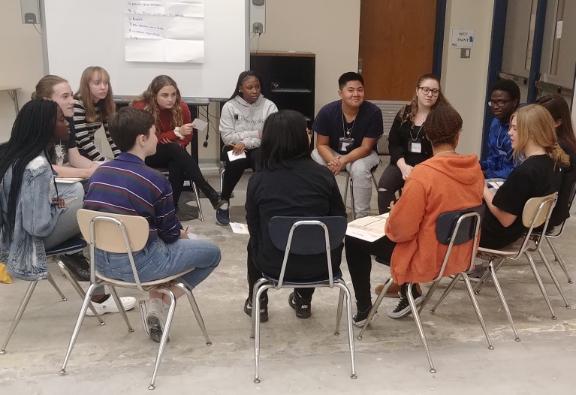Prom and Beyond: Reflections on NY's Student Council Bill
Senate Bill S1732 symbolizes historic investment in student leadership across New York State. This is great; however, student leadership must go beyond symbols and tokens.
I am a 2022 graduate of Syracuse City Schools in Upstate New York. Throughout my K-12 education, I found the importance of true student voice and advocacy to better the civic climate in a school. Typically these values are assumed to be in high school student council bodies — however, student councils 1) do not exist at every high school, and 2) their scope of work varies drastically.
NY Senate Bill S1732 was introduced earlier this year and addresses this first point, reading the following in the legislation:
The board of education or trustees of every school district serving high school students in grades nine through twelve with no district wide or school building peer selected student government shall establish at least one student government organization within such district or school building with the goal of ensuring all eligible students have the opportunity to participate in such student government.
SB 1732 symbolizes historic investment in student leadership across New York State. This is great! However, student leadership must go beyond symbols and tokens. Addressing the second point raised, the actual work done by student councils is different in each school, ranging from prom committees to school policy to somewhere in between.
State legislators and school leaders should go beyond merely considering the existence of a student council, moving further to ensure the governing bodies are supported to be as effective as possible. A few considerations are below, informed by my own experiences in school organizing and a conversation with a student council member from Syracuse.
Leo Mann is a recent graduate of my alma mater, Nottingham High School, and just completed his term as the Class of 2023 secretary. When I asked Leo about his council’s focus in our May 2023 interview, he quickly brought up prom: a classic senior year event. At Nottingham, he specifically spoke about affordability for the event.
“I think that a big thing for us is that we try to advocate for some of the students that maybe can't afford prom tickets, or other things like senior dues. So, we’ve been doing a lot of outreach with students that had kind of shown concern about it, and trying to keep that as lowkey as we could.”
79% of students at Nottingham are economically disadvantaged, coming from families that participate in some government assistance program, such as Food Stamps or Social Security Insurance. Students across New York have highly diverse backgrounds. By the nature of that, some schools serve more low-income or more high-income students than others.
The work that Leo and his peers did to ensure equitable access to school events is both admirable and important. Their capacity was dedicated to the outreach work that Leo described, while some student council bodies at wealthier schools might not need to consider these kinds of socioeconomic factors at all. It’s crucial that schools with more low-income students are not limited in their student council’s scope of work, including thinking about school policy, and that education leaders are aware of this issue.
One possible solution to this issue is hosting multiple student council/leadership organizations, where students are able to focus on different areas across the school. For example, Leo suggested adding a student honor board model for Nottingham, citing the board at his cousin’s school. This board is made up of a few students who provide input on disciplinary procedures for their peers, acting as its “own type of mediation.” Student council opportunities such as this could equip students to affect more tangible change in their schools.
Another topic that Leo and I discussed was student council partnership with the local community. He boasted the year below him—the Class of 2024 Student Council—and their creative efforts here: “They ended up renting out an SU [Syracuse University] parking spot, so have been generating money from certain SU games. I think for the first time, they're doing their prom in one of the buildings of ESF [SUNY College of Environmental Science and Forestry], which is really interesting.”
In terms of scope of work, even with local partnership, the student council across classes at Nottingham is mostly focused on event planning. Leo notices that student voices about school policy reform tends to be focused in other clubs.
One interesting club to note is Community Wide Dialogue, a dialogue exchange program where students from urban and non-urban schools in Central New York are paired to engage in dialogue on race and their respective school climates. After weeks of dialogue, students from each school develop a school project. Leo has been involved in Community Wide Dialogue at Nottingham for two years and this year, their culminating project was implementing a mentorship program between older and younger students.

High school students from multiple schools engaging in dialogue through the Community Wide Dialogue program. Photo by Interfaith Works of Central New York.
By the nature of the Community Wide Dialogue program, students are exposed to other school settings and policies. I believe that this is a great model to consider for student councils: opportunities for councils to engage regionally and share ideas. This model is done at many higher civic levels and should be considered by student councils across the state.
NY Senate Bill S1732, if passed, is a momentous step forward for student voice and civic education across New York State. Implementation of this legislation is key, however. Education leaders should prioritize access to leadership opportunity across socioeconomic backgrounds, as well as consider regional models for students to meet across schools. Every student should have the opportunity to affect real change in their school experiences, and therefore, their future.